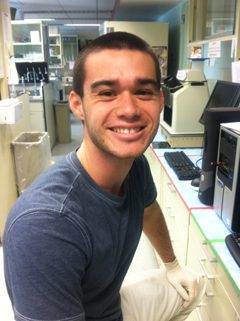Mark Mullan Rose Hills
Characterizing the Arabidopsis warp2 Gene Responsible For Responding to Temperature Signals by Affecting the Circadian Clock
Circadian clocks are endogenous timers that allow organisms to anticipate daily changes in their environment, and adapt accordingly. In plants, growth, photosynthetic activity, and flowering time are all processes through which circadian regulation plays an integral role. Over the summer, I will be working with Arabidopsis thaliana, one of the model organisms used for plant genetics. The population has mutations in their warm acute response of prr7 (warp) genes, causing them to have acute responses to temperature signals that set circadian rhythms. My objective is to determine both how warp2 affects phenotype, and where in the Arabidopsis genome the warp2 gene lies. We will use this information to place the genes associated with the warp2 mutant in the context of other established circadian factors. Identifying the signaling networks that communicate temperature information to the circadian clock has the potential to provide insight on the effects that our warming climate will have on the agriculture industry.
Message To Sponsor
For the past five summers, I have worked full time to pay for school instead of taking classes or doing unpaid internships in a laboratory. The work was enjoyable, but I always envied my friends who were gaining laboratory experience. Thus, I am very grateful that the SURF/Rose Hill fellowship will grant me the unique opportunity to continue learning in the laboratory sans fiscal concerns. I view this summer as one that will have an enormous impact on my future career in research, and it would not be possible without the Rose Hill Foundations generosity. With my utmost humility, I want to thank the Foundation for making this summer possible!